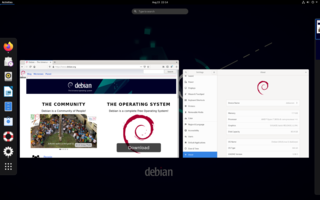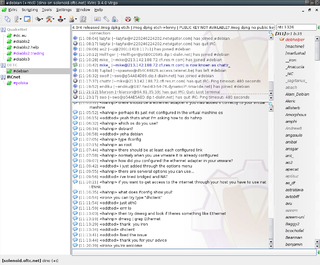
Debian, also known as Debian GNU/Linux, is a Linux distribution composed of free and open-source software, developed by the community-supported Debian Project, which was established by Ian Murdock on August 16, 1993. The first version of Debian (0.01) was released on September 15, 1993, and its first stable version (1.1) was released on June 17, 1996. The Debian Stable branch is the most popular edition for personal computers and servers. Debian is also the basis for many other distributions, most notably Ubuntu.

GNU is an extensive collection of free software, which can be used as an operating system or can be used in parts with other operating systems. The use of the completed GNU tools led to the family of operating systems popularly known as Linux. Most of GNU is licensed under the GNU Project's own General Public License (GPL).

A Linux distribution is an operating system made from a software collection that includes the Linux kernel, and often a package management system. Linux users usually obtain their operating system by downloading one of the Linux distributions, which are available for a wide variety of systems ranging from embedded devices and personal computers to powerful supercomputers.

Security-Enhanced Linux (SELinux) is a Linux kernel security module that provides a mechanism for supporting access control security policies, including mandatory access controls (MAC).

The Linux Standard Base (LSB) was a joint project by several Linux distributions under the organizational structure of the Linux Foundation to standardize the software system structure, including the Filesystem Hierarchy Standard used in the Linux kernel. LSB was based on the POSIX specification, the Single UNIX Specification (SUS), and several other open standards, but extended them in certain areas.
Capability-based security is a concept in the design of secure computing systems, one of the existing security models. A capability is a communicable, unforgeable token of authority. It refers to a value that references an object along with an associated set of access rights. A user program on a capability-based operating system must use a capability to access an object. Capability-based security refers to the principle of designing user programs such that they directly share capabilities with each other according to the principle of least privilege, and to the operating system infrastructure necessary to make such transactions efficient and secure. Capability-based security is to be contrasted with an approach that uses traditional UNIX permissions and Access Control Lists.
A chroot on Unix and Unix-like operating systems is an operation that changes the apparent root directory for the current running process and its children. A program that is run in such a modified environment cannot name files outside the designated directory tree. The term "chroot" may refer to the chroot(2) system call or the chroot(8) wrapper program. The modified environment is called a chroot jail.
The Unix access rights flags setuid and setgid allow users to run an executable with the file system permissions of the executable's owner or group respectively and to change behaviour in directories. They are often used to allow users on a computer system to run programs with temporarily elevated privileges in order to perform a specific task. While the assumed user id or group id privileges provided are not always elevated, at a minimum they are specific.
Technical variations of Linux distributions include support for different hardware devices and systems or software package configurations. Organizational differences may be motivated by historical reasons. Other criteria include security, including how quickly security upgrades are available; ease of package management; and number of packages available.
Unix-like operating systems identify a user by a value called a user identifier, often abbreviated to user ID or UID. The UID, along with the group identifier (GID) and other access control criteria, is used to determine which system resources a user can access. The password file maps textual user names to UIDs. UIDs are stored in the inodes of the Unix file system, running processes, tar archives, and the now-obsolete Network Information Service. In POSIX-compliant environments, the command-line command id gives the current user's UID, as well as more information such as the user name, primary user group and group identifier (GID).
binfmt_misc is a capability of the Linux kernel which allows arbitrary executable file formats to be recognized and passed to certain user space applications, such as emulators and virtual machines. It is one of a number of binary format handlers in the kernel that are involved in preparing a user-space program to run.

PulseAudio is a network-capable sound server program distributed via the freedesktop.org project. It runs mainly on Linux, various BSD distributions such as FreeBSD and OpenBSD, macOS, as well as Illumos distributions and the Solaris operating system.
HAL is a software subsystem for UNIX-like operating systems providing hardware abstraction.

gNewSense was a Linux distribution, active from 2006 to 2016. It was based on Debian, and developed with sponsorship from the Free Software Foundation. Its goal was user-friendliness, but with all proprietary and non-free software removed. The Free Software Foundation considered gNewSense to be composed entirely of free software.

In computing, SystemTap is a scripting language and tool for dynamically instrumenting running production Linux-based operating systems. System administrators can use SystemTap to extract, filter and summarize data in order to enable diagnosis of complex performance or functional problems.

WeeChat is a free and open-source Internet Relay Chat client that is designed to be light and fast. It is released under the terms of the GNU GPL-3.0-or-later and has been developed since 2003.

Linux-libre is a modified version of the Linux kernel that contains no binary blobs, obfuscated code, or code released under proprietary licenses. In the Linux kernel, they are mostly used for proprietary firmware images. While generally redistributable, binary blobs do not give the user the freedom to audit, modify, or, consequently, redistribute their modified versions. The GNU Project keeps Linux-libre in synchronization with the mainline Linux kernel.

KVIrc is a graphical IRC client for Linux, Unix, Mac OS and Windows. The name is an acronym of K Visual IRC in which the K stands for a dependency to KDE, which became optional from version 2.0.0. The software is based on the Qt framework and its code is released under a modified GNU General Public License.

GNU Guix is a functional cross-platform package manager and a tool to instantiate and manage Unix-like operating systems, based on the Nix package manager. Configuration and package recipes are written in Guile Scheme. GNU Guix is the default package manager of the GNU Guix System distribution.











